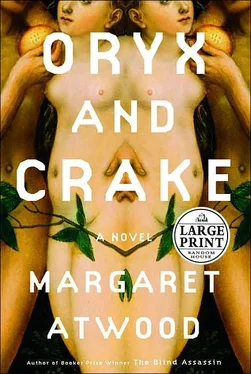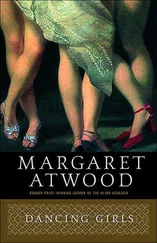The month could have been October, or else November; the leaves still turned colour then, and they were orange and red. It was muddy underfoot—he must have been standing in a field—and it was drizzling. The bonfire was an enormous pile of cows and sheep and pigs. Their legs stuck out stiff and straight; gasoline had been poured onto them; the flames shot up and out, yellow and white and red and orange, and a smell of charred flesh filled the air. It was like the barbecue in the backyard when his father cooked things but a lot stronger, and mixed in with it was a gas-station smell, and the odour of burning hair.
Jimmy knew what burning hair smelled like because he’d cut off some of his own hair with the manicure scissors and set fire to it with his mother’s cigarette lighter. The hair had frizzled up, squiggling like a clutch of tiny black worms, so he’d cut off some more and done it again. By the time he was caught, his hair was ragged all along the front. When accused he’d said it was an experiment.
His father had laughed then, but his mother hadn’t. At least (his father said) Jimmy’d had the good sense to cut the hair off before torching it. His mother said it was lucky he hadn’t burnt the house down. Then they’d had an argument about the cigarette lighter, which wouldn’t have been there (said his father) if his mother didn’t smoke. His mother said that all children were arsonists at heart, and if not for the lighter he’d have used matches.
Once the fight got going Jimmy felt relieved, because he’d known then that he wouldn’t be punished. All he had to do was say nothing and pretty soon they’d forget why they’d started arguing in the first place. But he also felt guilty, because look what he’d made them do. He knew it would end with a door being slammed. He scrunched down lower and lower in his chair with the words whizzing back and forth over his head, and finally there was the bang of the door—his mother this time—and the wind that came with it. There was always a wind when the door got slammed, a small puff—whuff!—right in his ears.
“Never mind, old buddy,” said his father. “Women always get hot under the collar. She’ll cool down. Let’s have some ice cream.” So that’s what they did, they had Raspberry Ripple in the cereal bowls with the blue and red birds on them that were handmade in Mexico so you shouldn’t put them in the dishwasher, and Jimmy ate his all up to show his father that everything was okay.
Women, and what went on under their collars. Hotness and coldness, coming and going in the strange musky flowery variable-weather country inside their clothes—mysterious, important, uncontrollable. That was his father’s take on things. But men’s body temperatures were never dealt with; they were never even mentioned, not when he was little, except when his dad said, “Chill out.” Why weren’t they? Why nothing about the hot collars of men? Those smooth, sharp-edged collars with their dark, sulphurous, bristling undersides. He could have used a few theories on that.
The next day his father took him to a haircut place where there was a picture of a pretty girl in the window with pouty lips and a black T-shirt pulled down off one shoulder, glaring out through smudgy charcoal eyes with a mean stare and her hair standing up stiff like quills. Inside, there was hair all over the tiled floor, in clumps and wisps; they were sweeping it up with a push broom. First Jimmy had a black cape put on him, only it was more like a bib, and Jimmy didn’t want that, because it was babyish. The haircut man laughed and said it wasn’t a bib, because who ever heard of a baby with a black bib on? So it was okay; and then Jimmy got a short all-over cut to even out the ragged places, which maybe was what he’d wanted in the first place—shorter hair. Then he had stuff out of a jar put on to make it spiky. It smelled like orange peels. He smiled at himself in the mirror, then scowled, thrusting down his eyebrows.
“Tough guy,” said the haircut man, nodding at Jimmy’s father. “What a tiger.” He whisked Jimmy’s cut-off hair onto the floor with all the other hair, then removed the black cape with a flourish and lifted Jimmy down.
At the bonfire Jimmy was anxious about the animals, because they were being burned and surely that would hurt them. No, his father told him. The animals were dead. They were like steaks and sausages, only they still had their skins on.
And their heads, thought Jimmy. Steaks didn’t have heads. The heads made a difference: he thought he could see the animals looking at him reproachfully out of their burning eyes. In some way all of this—the bonfire, the charred smell, but most of all the lit-up, suffering animals—was his fault, because he’d done nothing to rescue them. At the same time he found the bonfire a beautiful sight—luminous, like a Christmas tree, but a Christmas tree on fire. He hoped there might be an explosion, as on television.
Jimmy’s father was beside him, holding on to his hand. “Lift me up,” said Jimmy. His father assumed he wanted to be comforted, which he did, and picked him up and hugged him. But also Jimmy wanted to see better.
“This is where it ends up,” said Jimmy’s father, not to Jimmy but to a man standing with them. “Once things get going.” Jimmy’s father sounded angry; so did the man when he answered.
“They say it was brought in on purpose.”
“I wouldn’t be surprised,” said Jimmy’s father.
“Can I have one of the cow horns?” said Jimmy. He didn’t see why they should be wasted. He wanted to ask for two but that might be pushing it.
“No,” said his father. “Not this time, old buddy.” He patted Jimmy’s leg.
“Drive up the prices,” said the man. “Make a killing on their own stuff, that way.”
“It’s a killing all right,” said Jimmy’s father in a disgusted tone. “But it could’ve been just a nutbar. Some cult thing, you never know.”
“Why not?” said Jimmy. Nobody else wanted the horns. But this time his father ignored him.
“The question is, how did they do it?” he said. “I thought our people had us sealed up tight as a drum.”
“I thought they did too. We fork out enough. What were the guys doing? They’re not paid to sleep.”
“It could’ve been bribery,” said Jimmy’s father. “They’ll check out the bank transfers, though you’d have to be pretty dumb to stick that kind of money into a bank. Anyway, heads will roll.”
“Fine-tooth comb, and I wouldn’t want to be them,” said the man. “Who comes in from outside?”
“Guys who repair things. Delivery vans.”
“They should bring all that in-house.”
“I hear that’s the plan,” said his father. “This bug is something new though. We’ve got the bioprint.”
“Two can play at that game,” said the man.
“Any number can play,” said Jimmy’s father.
“Why were the cows and sheep on fire?” Jimmy asked his father the next day. They were having breakfast, all three of them together, so it must have been a Sunday. That was the day when his mother and his father were both there at breakfast.
Jimmy’s father was on his second cup of coffee. While he drank it, he was making notes on a page covered with numbers. “They had to be burned,” he said, “to keep it from spreading.” He didn’t look up; he was fooling with his pocket calculator, jotting with his pencil.
“What from spreading?”
“The disease.”
“What’s a disease?”
“A disease is like when you have a cough,” said his mother.
“If I have a cough, will I be burned up?”
“Most likely,” said his father, turning over the page.
Jimmy was frightened by this because he’d had a cough the week before. He might get another one at any moment: already there was something sticking in his throat. He could see his hair on fire, not just a strand or two on a saucer, but all of it, still attached to his head. He didn’t want to be put in a heap with the cows and pigs. He began to cry.
Читать дальше












